- Home
- Ninie Hammon
Black Water Page 8
Black Water Read online
Page 8
“It’s not dumb because it isn’t destiny.” Dobbs had glommed onto that interpretation of reality and would not let it go. Like maybe he’d always wanted to believe they could have changed things years ago, or felt guilty that they hadn’t tried. “We proved it isn’t inevitable, engraved in granite. What your mama painted doesn’t have to come true.”
“We didn’t prove nothing of the kind. We didn’t keep this woman from putting a hole in her head just like Mama painted, did we? We didn’t keep her from killing herself, neither. We only put it off a little while. If she’s determined, ain’t nobody—”
“We got to try, T.J. You know we do.”
He didn’t know any such thing, but he shook his head and said nothing. There was no changing Dobbs’s mind when he’d plotted a course and set sail on it. He was a battleship … no, an aircraft carrier … sailing resolutely forward, full steam ahead. Turning an aircraft carrier wasn’t no easy thing at all.
But it was still dumb.
A bright shaft of sunlight shined into Bailey’s eyes, blinding her. But even more blinding than the sun poised to attack outside the drawn curtains was the relentless cheeriness of the nurse.
Short, roughly the size and shape of a vending machine, the woman chirped like the first robin of spring as she waddled over to the window, yanked back the room-darkening draperies, pulled up the shades, and began to crank the head of Bailey’s bed up into a sitting position.
“Ready for a normal breakfast, are we?” she asked. “A day of regular diet and a couple of strolls down the hallway to the end and back and you’ll be ready for discharge tomorrow.”
“Go away and leave me alone.” Bailey squeezed her eyes shut against the glare. “I’m not hungry.”
“But we have to eat to get our strength back.”
“If eating is what makes us strong, you must be ready to bench press a Buick.”
Bailey was instantly sorry she’d said that. She had never been capable of cruelty. Had the bullet in her brain changed that? Did she get a pass now because she had a hole in her head? No, it hadn’t and no, she didn’t.
The woman blew by the insult, though, either didn’t hear it, didn’t understand it or didn’t care. She set the tray down on the tray holder that stretched out across the bed and began to untie the restraints that held Bailey’s arms affixed to the side rails.
Bailey flexed one arm and then the other, then reached up and ruthlessly scrubbed an imaginary itch on her nose.
She looked at the breakfast tray. The plate held some lumpy yellow substance that was either a scrambled egg or toenail fungus, two overcooked link sausages it took no imagination whatsoever to envision emanating from the south side of a dog going north and two slices of what was either wheat toast or buttered particle board. A reasonable facsimile of a blueberry muffin sat beside the napkin and plastic cutlery.
She held up the fork. “You sure I’m not going to try to off myself with this?”
“I’m going to sit right here and keep you company while you eat,” the woman burbled. “And here,” she indicated a piece of paper and a pencil, “is your satisfaction survey.”
“You’re joking.” Bailey picked up the pencil and drew a giant frowny-face on the survey and held it up for the woman to see before dropping it face-down on the tray and reaching for a glass of water, grateful she could drink it all by herself — like a big girl.
There was a timid knock on the door. Bailey and the woman spoke together with the perfect unison of a Greek chorus.
“Go away!”
“Come in!”
The door opened slowly and in walked an old man who looked familiar. Bailey ought to know who he was, but the memory was one of the scattered crayons.
She tried to concentrate, but that kind of mental effort was tiring and she really didn’t care enough to dig around for — he had a dog, an adorable little dog!
He’d stopped and talked to her when she was painting outside on the front porch that day — the day she had jammed full of tasks and activities to occupy her mind and time until she was ready to…
There was more, though. What was it?
He had come to her house that night, too! She’d been sitting at the table in the kitchen with the gun and he’d knocked on her door and…
That part faded into gray fog, not a misplaced crayon — gone. Retrograde amnesia. The doctor said most people with traumatic brain injuries couldn’t remember what happened right before they suffered the injury.
Though she couldn’t remember the images from the man’s visit, she could remember the emotions. She’d been mad at him, furious. She’d wanted him to leave, get out of her house, and he wouldn’t go.
Even absent the why, she felt the same anger now.
What was he … what were they doing here?
Behind him was a mountain of a man dressed in bib overalls, with broad shoulders, an equally broad belly and a head of unruly white hair.
“Good morning, Miss Bailey,” the black man said, clearly as uncomfortable to be here as she was to have him. “This here’s Raymond Dobson. Me ‘n him’s been friends our whole lives, ain’t we, Dobbs?”
“We sure have,” the big man said, forced affability making it look like he’d learned how to smile from a manual. “Since we were knee-high to grasshoppers.”
“We just come by to check on you,” the skinny man said.
“To see how you’re doing.”
“Dobbs here was gonna bring you flowers from the gift shop in the lobby but they couldn’t make change. He always carries a hundred-dollar bill in his wallet. Mad money. He’d stuff it down in his shoe, but if he did, wouldn’t nobody take it when he tried to spend it.”
The old man was babbling like a magpie!
Before she had a chance to speak, the door opened and a nurse backed into the room, hauling behind her a piece of medical equipment, with knobs and buttons, and leads sprouting from the top like Medusa’s head of snakes.
The chirpy nurse asked what she was doing in here. The pushy nurse said this was Room 319, wasn’t it, and she’d been instructed to perform some unpronounceable medical procedure/test on its occupant.
The chirpy nurse informed the intruder that this was Room 319, alright, but the patient was not scheduled for any kind of medical procedure. She took two steps and began to shove the machine back out the door. Pushy nurse stood her ground and they began to play reverse tug of war, pushing the machine one way and then back the other. Bailey watched, mildly amused until a doctor — you could tell by the stethoscope around his neck — put an end to the fracas by ordering both nurses out of the room and into the hallway where you could hear the dressing-down they were getting through the closed door.
It wasn’t until then that Bailey became aware that the two men were still there, shoved aside by the war of the titans. She was not amused by that. Not even a little bit. A homeless memory bobbed to the surface of her mind and floated there alone. A painting of a face. It had something to do with the old man, and all the emotion surrounding it was rage.
“What are you doing here?” She set down the water glass, dropped the pencil from her left hand and used both hands to make shooing gestures. “No, don’t answer that. I don’t want to know why you’re here. I just want you to leave. Now!”
The old man surprised her by agreeing instantly, apologetically, then totally flummoxed her by asking politely, “If you ain’t gonna eat that blueberry muffin,” he indicated the only piece of identifiable food on the tray, “I sure would like to have it.”
The other man looked as surprised as Bailey was. Holding onto her temper by a thread, she growled through clenched teeth, “Take it. You can have everything on the whole tray if you want it. Just go!”
The man hopped forward, carefully wrapped the napkin around the muffin, and held it in front of him like he was carrying a Ming vase. He scurried out of the room without a backward glance and the bigger man lumbered after him.
They were both already gone wh
en the memory bloomed in bright color in her mind, a painting done in exquisite detail. A portrait of her face … with a bullet hole in her temple. And a mosquito bite above her right eyebrow.
The incredulity in Dobbs’s voice was thick enough to pave a street.
“A blueberry muffin! What was that about? I would have given you one of the Krispy Kreme doughnuts if I’d known you were only moments away from starving to death.”
T.J. pushed past him and headed for the sign that said “Stairs” above a door across the hall. He shoved open the door, went out into the stairwell and stood looking down at what he held in his right hand.
Then he began to pace back and forth, so rattled he was unable to stand still.
Dobbs followed him out the door, totally mystified.
“You were willing to be bull-goose rude to get that muffin — are you going to eat it or just walk around holding it in your hand?”
T.J. noticed he still had the muffin and shoved it at Dobbs.
“You eat it.” When Dobbs wouldn’t take it, he dropped it on the floor and continued his pacing circuit of the small space, his mind so full of thoughts and feelings and images he couldn’t seem to grab hold of any one of them to think or feel or see.
“T.J. … what in tarnation—?”
“This!”
T.J. stopped in front of Dobbs and held out the napkin he’d wrapped around the muffin. On top of the napkin was a piece of paper he’d picked up with it, covered in blueberry muffin crumbs. Dobbs took it, shook off the crumbs and examined it.
On one side was some kind of “satisfaction survey.” There was a frowny-face drawn across the front.
On the other side was a pencil sketch.
“Didn’t you see her?” T.J. asked. Dobbs looked blank. “While the nurses were playing king of the mountain, Bailey was drawing on this piece of paper.”
“She drew this? Looks like … what? A Cracker Jack box?”
“That’s not a Cracker Jack box.” He paused, spoke the rest in a soft voice because the wind had been so totally knocked out of him he didn’t have enough air to say the words any louder. “Don’t you see — it’s a window! An empty window.”
Dobbs didn’t physically back away from him because there was nowhere to go in such a small space. But with every possible syllable of body language, he was shouting “No!” and scrambling to put distance between himself and what T.J. had just said.
“Whoa there, Bessie! Let’s back this wagon up to the barn and start loading it all over again.” Dobbs’s voice came out a bit high and reedy. Nobody else would have picked up on a sound change that subtle, but to T.J. it was as obvious as a cigarette butt on a birthday cake. “This is a rectangle. Okay, a box. But a window? Come on, T.J. And those marks down at the bottom, those could be any—”
“That’s a table … that line is a tabletop, can’t you see?” Dobbs said nothing. “And that circle there, it’s a bowl, the beginning of a bowl, anyway, a bowl of fruit. And behind all that is the window.”
“The rectangle.”
“The window!” T.J. began to pace restlessly back and forth on the stairway landing again, too agitated in body and spirit to hold still. “How? Why? I don’t get it.”
“I don’t see that there’s anything to get. You’re running waaaay out past your headlights here, T.J. The woman in the bed drew a sketch—”
“While those nurses were arguing.”
“Yeah, okay, she drew it while—”
“While she was watching those nurses argue.”
“We were all three watching the argument.”
“We weren’t all three drawing a picture with one hand and holding a glass of water in the other — while we were looking at something else entirely.”
He had Dobbs’s attention now.
“I watched her. She never took her eyes off them nurses, but she still picked up the pencil and started drawing on the back of that piece of paper. Never once looked down at it.”
“Oh, now there’s a conundrum to mystify the ancients. Totally unheard of in all of human history for somebody to doodle. That day I spent half an hour on hold waiting to yell at the guy at the DMV for losing my truck title — I looked down at the notepad I’d written the phone number on and saw I’d covered it up with shapes, marked out the number with a bunch of ugly black swirls that looked like tornadoes. Everybody doodles.”
“You’re not listening, Dobbs.” But T.J. wasn’t irritated. He was past any emotion as simple and clarifying as irritation. “She was drawing a picture without looking at it … with her left hand.”
“And that’s significant because…?”
“If you’s gonna blow your brains out, chances are you’d hold the gun in your dominant hand. Don’t ya think?”
“The bullet hole was in her right temple so—”
“She’s right-handed.”
Dobbs was beginning to get it. “I never heard of anybody who could do a thing like that.”
“Yes, you have.” T.J.’s voice was soft and even he could hear how haunted it sounded. “Mama could. She could paint with both hands at the same time.”
Chapter Nine
T.J. sits in the golden shaft of afternoon sunlight streaming through the window of his room. He pushes a car across the rough boards of the floor. Back and forth. Back and forth. The toy car belongs to Dobbs, who told him to take it home with him tonight and play with it. Dobbs is like that. He has way more of everything than T.J. and he is always generous, always wanting to help his friend.
Like he wanted to help this afternoon as they sat on the riverbank, dabbling their toes in the cold creek water.
Dobbs knew T.J. was upset and T.J. knew he had to tell Dobbs about it. Had to tell somebody and who else was there, who else did he want to confide in but his best friend?
But he hadn’t known where to start.
“She’s different,” he said simply.
“Your mama?”
“Since she woke up after she hit her head, she’s different.”
Dobbs knew that T.J.’s mama had fallen off a ladder in the kitchen of the Whittakers’ house and hit her head on the hardwood floor. She was knocked unconscious and she didn’t wake up. Mr. Whittaker had actually lifted her up and took her into the living room and laid her down on their red velvet sofa, the one with brocade cushions they’d bought in Charleston that were the same color.
He probably wouldn’t have laid her down on the sofa if her head had been bleedin’, but it wasn’t. She had a goose egg that kept getting bigger and bigger on the right side of her head, where they speculated maybe she’d connected with the kitchen table when she fell. But they finally decided it was just the floor done it.
They’d even called a white doctor to come see to her! Of course, T.J. didn’t hear about any of this until later, when they brought her home in Mr. Whittaker’s car, carried her carefully into the house and laid her on her bed with the mattress filled with corn husks. He’d heard Mr. Whittaker tell his father that they “did everything we could” and that the white doctor had said there wasn’t no treatment, they just had to wait for her to wake up.
His daddy had asked when that’d be and Mr. Whittaker said the doctor didn’t know how long she’d be unconscious. It sounded to T.J. like Mr. Whittaker wanted to say more and maybe he had said more as Pa walked beside him out to his car, but T.J. hadn’t heard that part. He’d set himself down beside his mother’s bed and wouldn’t leave it. For once, his father hadn’t been a monster in a human being suit, and had not forced him to go to school the next day.
After that, it was Saturday and he could stay home to look after his mother. The neighbor ladies came and went, but T.J. never left her side unless they shooed him out for “privacy,” they said. But his mother never moved. Never opened her eyes. Never said a thing.
On Sunday, he’d sneaked away briefly to meet Dobbs in the woods, to tell him what was going on. The two had been forbidden to play together by Dobbs’s mother, so they had to go w
here wasn’t nobody looking, which wasn’t hard since there was woods everywhere.
T.J.’s mama hadn’t cared. She had invited Dobbs inside and fed him her fresh gingersnap cookies and laughed when he showed her how he could cross his eyes and stick out his tongue and look like a lizard. Dobbs thought T.J.’s mother was wonderful. And he had enough sense to make himself scarce anytime T.J.’s father was around.
T.J. didn’t go to school on Monday, either. By then, he could hear whispered conversations about his mama “slipping away” and he could see it. Her eyes were sunken, her lips parched and split. She hadn’t had nothing to eat or drink since Thursday. Even a boy of eight knew you couldn’t live long if you didn’t eat or drink nothing.
When wasn’t nobody in the room, he took her hand and squeezed it and begged her to wake up. He cried and pleaded with her, but her eyes remained closed, her breathing gettin’ more and more shallow every day.
He had been outside, going to the privy when he heard the shout from inside. It terrified him at first. The sudden fear in his belly hurt worse than if he’d been stabbed there. She was dead! He had left and she had died while he was gone.
But the cry had come from one of the women sittin’ with his mother and she didn’t sound sorrowful.
When he raced into his mother’s bedroom, she turned her black eyes toward him and smiled. Just a little smile but it was enough.
It had taken more’n a week for his mother to get back on her feet again. She was all trembly from lying there not moving for so long, or so the other grownups said. But T.J. saw it was more than that. He watched her closely, studied her, knew every crease, line and plane on her face and there was somethin’ there he had not seen before. He didn’t know what it was, but she had awakened “different,” not the same person she’d been before she fell.
It was going on two weeks after the accident that he came home from school and discovered she’d set up her easel in the shed and was in there, paintin’. She never painted at home. What was there to paint ‘cept the grinning faces of the tourists’ children down at the dock and marina?

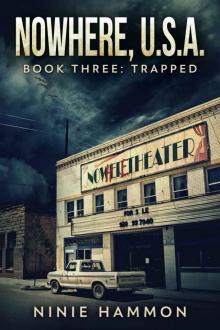 Trapped (Nowhere, USA Book 3)
Trapped (Nowhere, USA Book 3)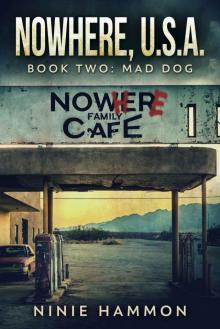 Mad Dog (Nowhere, USA Book 2)
Mad Dog (Nowhere, USA Book 2) Black Water
Black Water Nowhere USA: The Complete Series: A Psychological Thriller series (Nowhere, USA)
Nowhere USA: The Complete Series: A Psychological Thriller series (Nowhere, USA)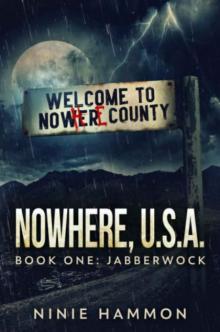 The Jabberwock
The Jabberwock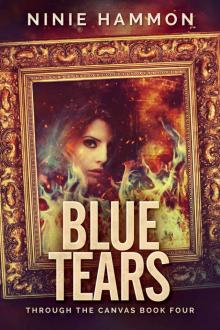 Blue Tears
Blue Tears Blown Away (Nowhere, USA Book 6)
Blown Away (Nowhere, USA Book 6)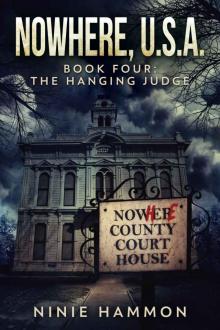 The Hanging Judge (Nowhere, USA Book 4)
The Hanging Judge (Nowhere, USA Book 4) Sudan: A Novel
Sudan: A Novel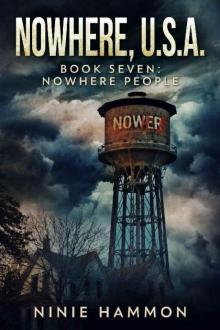 Nowhere People (Nowhere, USA Book 7)
Nowhere People (Nowhere, USA Book 7)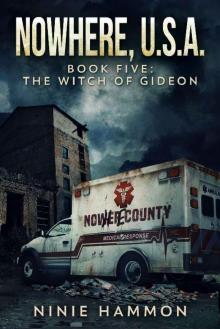 The Witch of Gideon (Nowhere, USA Book 5)
The Witch of Gideon (Nowhere, USA Book 5) Red Web
Red Web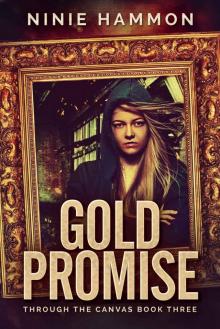 Gold Promise
Gold Promise All Their Yesterdays
All Their Yesterdays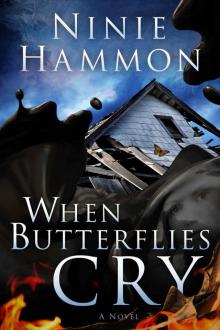 When Butterflies Cry: A Novel
When Butterflies Cry: A Novel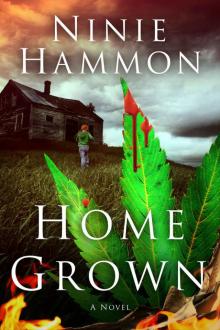 Home Grown: A Novel
Home Grown: A Novel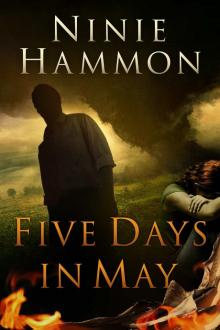 Five Days in May
Five Days in May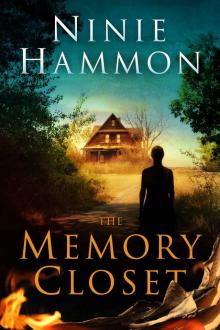 The Memory Closet
The Memory Closet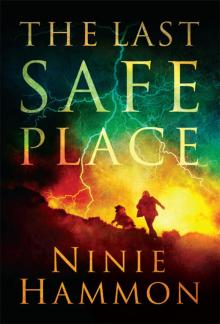 The Last Safe Place
The Last Safe Place The Knowing Box Set EXTENDED EDITION: Exclusive New Material
The Knowing Box Set EXTENDED EDITION: Exclusive New Material